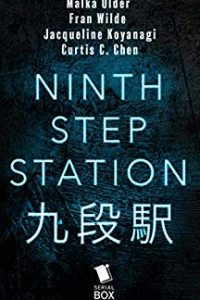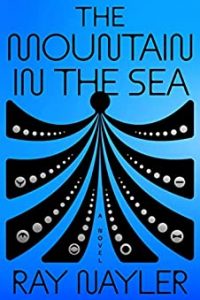Rich Horton and Gary K. Wolfe Review Anthologies Edited by Jonathan Strahan
 Mission Critical, Jonathan Strahan, ed. (Solaris 978-1781085806) July 2019.
Mission Critical, Jonathan Strahan, ed. (Solaris 978-1781085806) July 2019.
Jonathan Strahan’s new anthology is Mission Critical. The theme is characters responding to desperate situations, when something goes pear-shaped. Oddly, many of the stories, all well executed, seem a bit too much the same in adhering to the theme. The best are “Hanging Gardens” by Gregory Feeley, and “Cyclopterus” by Peter Watts. Feeley’s story is set on Mars, as a terraforming effort is under way, comets sent crashing into the surface. Mars, it seems, is inhabited by communes working to help the terraforming effort along, presumably for the benefit of the people living in the Hanging Gardens, the satellites orbiting the planet. One of the comets misses, and their habitat is destroyed, and seven children, guided by a perhaps not entirely trustworthy AI, have to try to reach safety and potential rescue. This is exciting stuff, with solid scientific extrapolation and with an undercurrent (eventually surfacing) of political ramifications that is not exactly reassuring. Watts’s story is terribly dark – but it’s Peter Watts, after all. Alistor Galik comes to an undersea research establishment with orders to determine if the formerly protected seafloor can be profitably mined. The pilot of his submarine resents this, and Galik asks why she doesn’t fight back. A disaster intervenes, some sort of underwater wave, and they are forced to try to navigate the submarine to safety. It’s clear that this is a future Earth already destroyed, and perhaps the only safe places are under the ocean – but even that safety is illusory. At any rate, Galik has his own plans…. A bleak story, guided by Watts’ fierce intelligence and twisty plot sense.
Recommended Stories
“Hanging Gardens”, Gregory Feeley (Mission Critical)
“Cyclopterus”, Peter Watts (Mission Critical)
–Rich Horton
 The Best Science Fiction and Fantasy of the Year, Volume Thirteen, Jonathan Strahan, ed. (Solaris 978-1-78108-576-9, $19.99, 600pp, tp) April 2019. Cover by Jim Burns.
The Best Science Fiction and Fantasy of the Year, Volume Thirteen, Jonathan Strahan, ed. (Solaris 978-1-78108-576-9, $19.99, 600pp, tp) April 2019. Cover by Jim Burns.
I admit to being unconscionably late in covering Jonathan Strahan’s The Best Science Fiction and Fantasy of the Year, his thirteenth and final volume for Solaris, but the delay has provided a couple of unanticipated advantages. For one thing, it’s permitted me to partly rediscover the advantages of desultory reading, which is pretty much how I always approached these annuals before I started reviewing them more than 25 years ago. That means, in effect, skimming through the volume, unencumbered by any sense of duty, and reading the stories which first catch your eye, then working your way toward the selections less to your tastes and prejudices. This can play havoc with the editor’s carefully arranged sequence, of course, and it smacks of having dessert first, but I suspect it’s what a lot of readers do. The other advantage is that, should we feel so inclined, we can compare the editor’s choices with those stories that later won or were nominated for awards. For the record, Strahan’s batting average isn’t bad: looking just at the Nebula, Hugo, and Locus awards, 13 of the 30 stories here gained nominations and four won awards (two even won two awards), but that’s an absolutely pointless way of measuring the success of an anthology, and the reason I mention it here is that I found myself asking whether those award-nominated stories seemed notably superior to the other selections. And my answer was: sometimes, but generally not so much.
This leads me back to a point I find myself making every year, which is that, as general guides to the best and most interesting short SF/F in a given year, annuals such as Strahan’s (or Rich Horton’s, or Neil Clarke’s) are usually more reliable than award nominations. After all, those of us who nominate depend on what stories happen to come our way, or what websites we visit or magazines we follow. The days are long past when even the most eager reader could keep track of even a fraction of the short fiction available, while these editors, as a matter of doing their job, actively seek it out, sometimes in unexpected places. For example, the most deeply moving tale in Strahan’s annual (also included in Horton’s) comes from The Paris Review: “Firelight” is Ursula K. Le Guin’s heartbreaking farewell to one of her most beloved characters, Ged from the world of Earthsea. It only gained a Locus Award nomination. Carmen Maria Machado’s elegiac and visionary frontier story “A Brief and Fearful Star” appeared in Slate, while two of the most provocative SF tales, Elizabeth Bear’s smart-house nightmare “Okay, Glory” and S.L. Huang’s equally disturbing exploration of the possibilities of neurosurgery, “The Woman Who Destroyed Us”, came from the latest edition of the MIT Press Twelve Tomorrows series of anthologies. Those who didn’t come across individual story collections by N.K. Jemisin, Andy Duncan, and Kelly Barnhill would have missed the stories by those authors original to their collections.
This doesn’t mean that award nominations are without merit. Some of the selections with multiple nominations are among the strongest in the book. Brooke Bolander’s remarkable “The Only Harmless Great Thing” weaves together the actual early 20th-century history of factory girls poisoned by radium with the public electrocution of a renegade elephant into a passionate fantasia of injustices, while P. Djèlí Clark’s “The Secret Lives of the Nine Negro Teeth of George Washington” is an even more radical fantasia on America’s origins and racial history, but involving mermen, sorcerers, and mages along with the familiar military heroes and slaveholders. Both were triple nominees. Both John Crowley’s “Flint and Mirrors” and Andy Duncan’s “An Agent of Utopia” offer equally witty manipulations of British Tudor-era history, involving the alchemist John Dee in Crowley’s Case and Sir Thomas More in Duncan’s. Another triple nominee, Alix E. Harrow’s “A Witch’s Guide to Escape: A Practical Compendium of Portal Fantasies” no doubt appeals to readers largely because of its charming conceit that librarians are secretly witches and its argument that some “escapism” is well-earned, while another tale with a faux-academic title, Naomi Kritzer’s “Field Biology of the Wee Fairies”, seems just as appealing in a tale of a young girl who is far less interested in winning her own fairy – presented here as a kind of emblem of girlhood – than in getting admitted to her school’s science club.
As usual, Strahan’s selections are evenly divided between fantasy and SF. Among the outstanding SF stories are Kelly Robson’s “Intervention”, set in more or less the same universe as her Gods, Monsters, and the Lucky Peach, and dealing insightfully with issues of parenting and responsibility in a tale of a creche manager dealing with the kids on an asteroid habitat; S. Qiouyi Lu’s “Mother Tongue”, which touches upon a parent’s terrible sacrifice involving neuroscience and language; Vandana Singh’s “Widdam”, a kind of tech apocalypse told through three ingeniously linked points of view (the title is short for “World Destroying World Machine”); Yoon Ha Lee’s captivating far-future legend “The Starship and the Temple Cat” (which for me achieved a Cordwainer Smith-like resonance); Simone Heller’s bleak but poetic posthuman fable “When We Were Starless” (this one seemed to invoke the dying earth tradition of Vance and others); and Daryl Gregory’s “Nine Last Days on Planet Earth”, in which – characteristic for Gregory – dealing with family can be as challenging as dealing with a world-threatening apocalypse. The best robot stories are Annalee Newitz’s “The Blue Fairy’s Manifesto”, which somehow combines elements of Pinocchio with labor organizing in an automated factory, Ken Liu’s “Quality Time”, a sharp and funny Silicon Valley satire that, oddly enough, touches upon the uncertain role of humanities in product development.
In addition to the fantasy stories mentioned earlier, highlights include Garth Nix’s “The Staff in the Stone”, which tells, in the convincing tone of a received legend, of an itinerant magician trying to solve the puzzle of a totemic obelisk in which is embedded a sorcerer’s staff; N.K. Jemisin’s “The Sorcerer’s Replacement”, an acerbic and pointedly timely tale of a vain king seeking to assure his virility by eating a dragon’s heart; Jeffrey Ford’s “The Bookcase Expedition”, which manages to wring a wry epic out of a group of fairies trying to ascend a bookcase; Zen Cho’s Hugo-winning “If At First You Don’t Succeed, Try, Try Again”, which delightfully combines a Korean dragon legend with contemporary romantic comedy; and Alyssa Wong’s “Olivia’s Table”, set in a sharply realized Western ghost town where there are real ghosts. As always – and especially with the fantasy selections – Strahan has been careful to represent a wide variety of cultural traditions, as well as a variety of narrative modes and a range of tones, from the waggish comedy of T. Kingfisher’s “The Rose MacGregor Drinking and Admiration Society” to the grim sacrifice of S. Qiouyi Lu’s “Mother Tongues”. After honing his skills over thirteen volumes at Solaris, this seems to me one of Strahan’s strongest entries yet.
–Gary K. Wolfe
Rich Horton works for a major aerospace company in St. Louis MO. He has published over a dozen anthologies, including the yearly series The Year’s Best Science Fiction and Fantasy from Prime Books, and he is the Reprint Editor for Lightspeed Magazine. He contributes articles and reviews on SF and SF history to numerous publications.
Gary K. Wolfe is Emeritus Professor of Humanities at Roosevelt University and a reviewer for Locus magazine since 1991. His reviews have been collected in Soundings (BSFA Award 2006; Hugo nominee), Bearings (Hugo nominee 2011), and Sightings (2011), and his Evaporating Genres: Essays on Fantastic Literature (Wesleyan) received the Locus Award in 2012. Earlier books include The Known and the Unknown: The Iconography of Science Fiction (Eaton Award, 1981), Harlan Ellison: The Edge of Forever (with Ellen Weil, 2002), and David Lindsay (1982). For the Library of America, he edited American Science Fiction: Nine Classic Novels of the 1950s in 2012, with a similar set for the 1960s forthcoming. He has received the Pilgrim Award from the Science Fiction Research Association, the Distinguished Scholarship Award from the International Association for the Fantastic in the Arts, and a Special World Fantasy Award for criticism. His 24-lecture series How Great Science Fiction Works appeared from The Great Courses in 2016. He has received six Hugo nominations, two for his reviews collections and four for The Coode Street Podcast, which he has co-hosted with Jonathan Strahan for more than 300 episodes. He lives in Chicago.
These reviews and more like them in the October 2019 issue of Locus.
 While you are here, please take a moment to support Locus with a one-time or recurring donation. We rely on reader donations to keep the magazine and site going, and would like to keep the site paywall free, but WE NEED YOUR FINANCIAL SUPPORT to continue quality coverage of the science fiction and fantasy field.
While you are here, please take a moment to support Locus with a one-time or recurring donation. We rely on reader donations to keep the magazine and site going, and would like to keep the site paywall free, but WE NEED YOUR FINANCIAL SUPPORT to continue quality coverage of the science fiction and fantasy field.





